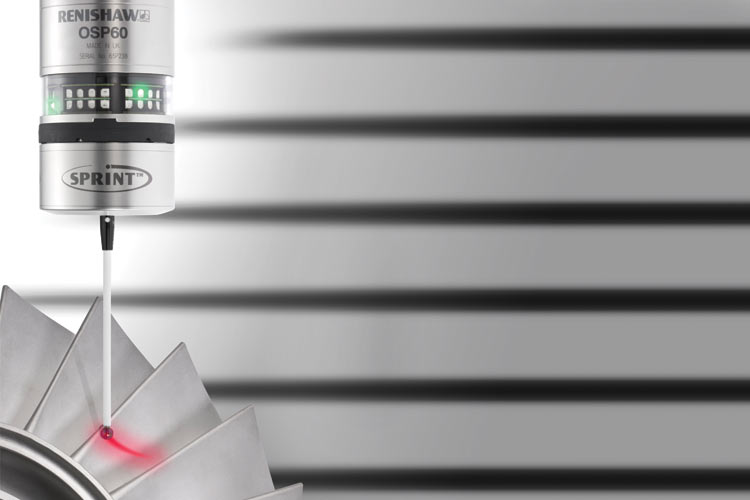At the IMTEX 2015 exhibition taking place at Bangalore International Exhibition Centre, Bangalore, India, from 22 – 28 January, Renishaw (hall 4 stand B-106) will highlight a range of process control solutions that help tackle the increasing drive to lean manufacturing, from new technologies for pre-process machine calibration, to on-line and off-line post-process measurement. There will also be a significant focus on the companys additive manufacturing (3D printing) systems with the new PlusPac upgrade for its AM250 additive manufacturing machine.
Major new introductions include a high-speed contact scanning system for CNC machine tools, a family of products for the measurement of aerospace blades, a new range of modular fixtures for metrology applications, and a miniature encoder system. The company will also have active demonstrations of its 5-axis scanning technology for CMMs, plus a demonstration of its Equator gauging system in an automated production cell, together with new process monitoring software.
Renishaw is the UK’s only manufacturer of a machine that ‘prints’ metal parts and visitors to the Renishaw stand will be able to see applications that demonstrate the capabilities of the company’s additive manufacturing technology, including the world’s first 3D printed metal bike frame.
SPRINT™ high-speed contact scanning system
Renishaw’s game-changing contact scanning system opens up completely new process control opportunities for high-value CNC machine tools. The SPRINT™ system incorporates a new generation of on-machine scanning technology that will deliver a step-change in the benefits of process control, enabling fast and accurate form and profile data capture from both prismatic and complex 3D components.
For blade manufacture, the SPRINT system provides unprecedented capability for blade tip refurbishment and root blending applications. For multi-task machining applications, the SPRINT machine tool scanning system offers users completely new process control capabilities, including exceptionally repeatable diameter measurement cycles.
Additional functionality offered by the SPRINT system provides a rapid health-check of a CNC machine tool’s linear and rotary axes in seconds, making it possible to implement a daily machine monitoring regime with little or no operator involvement.
Powerful suite of high performance blade measurement and analysis tools
At IMTEX Renishaw is highlighting a developing family of high performance hardware and software products for co-ordinate measuring machines that are specifically designed to aid the measurement and manufacturing of aerospace blades. All products complement the multi-award winning REVO® 5-axis measurement system and include APEXBlade™ planning softwarefor REVO sweep scanning and DMIS programming, MODUS™ aerofoil analysis for the calculation and reporting of blade section profile and aerofoil characteristics, and SurfitBlade™ to aid reverse engineering of the complete airfoil.

Renishaw fixtures: the new single source for metrology fixturing
Following the acquisition of R&R Sales LLC in 2012, Renishaw has developed an extensive new range of modular fixturing designed specifically for co-ordinate measuring machines (CMMs), vision systems and its Equator™ gauging system. Visitors to IMTEX 2015 will see that the new range offers a wide choice of base plates and components available in M4, M6 and M8 thread sizes, and can be utilised for measurement applications across multiple industries, such as aerospace, automotive and medical.
Automated gauging and process monitoring software for the Equator™ gauge
Renishaw Equator™, a lightweight, fast and highly repeatable gauge, will be demonstrated in an automated cell. Equator’s innovative flexible gauging technology is based on the comparison of production parts to a reference master part, which can greatly increase throughput and reduce scrap rates at a fraction of the cost of an equivalent custom gauging system. Equator can switch between parts in seconds, perfect for flexible manufacturing processes or accepting parts from multiple machines.
A new process monitoring window has also been added to the shop-floor user interface for the Equator gauging system. This instantly displays measurement results of inspected features to the operator on a bar-graph display. It also shows the history of measurement on each feature so that process trends can be seen. The system’s re-mastering process can now be managed based on temperature limits, number of parts or time since last master.
New developments in understanding rotary axes performance
For visitors to IMTEX 2015 who use five-axis machine tools, Renishaw has further extended its solutions for checking the alignment and positioning performance of machine tool rotary axes with the launch of new off-axis rotary software for its XR20-W rotary axis calibrator. The new software for the highly successful XR20-W now allows it to be used to measure the rotary positioning accuracy of an axis on many configurations of five axis machine tools, where the XR20-W often cannot be mounted on the centre of rotation.
Enhancements in metal 3D printing
Visitors to IMTEX 2015 will also see a new range of additive manufacturing technologies. Renishaw’s laser melting systems utilise a pioneering, additive manufacturing process capable of producing fully dense metal parts direct from 3D CAD, using a high-powered fibre laser. Parts are built from a range of fine metal powders that are fully melted in a tightly controlled atmosphere, in layer thicknesses ranging from 20 to 100 microns.

The AM250, Renishaw’s first additive manufacturing machine is now available with PlusPac – an add-on kit which transforms the machine to meet the demand for cleaner process environments, improved surface finish and precision. PlusPac includes new Optical Control Software (OCS), a gas knife lens window protection system, and a high capacity filtration system. These updates give the user tighter control over the build process, enabling users to create even better components.
World’s first 3D printed metal bike
Also on display will be a bike with the world’s first 3D printed metal frame. Empire Cycles, based in Bolton, UK, designed the mountain bike to take advantage of Renishaw’s additive manufacturing technology, allowing them to create a titanium alloy frame that would be both strong and light using topological optimisation. Individual sections have been bonded together and the new frame is some 33% lighter than the original.


